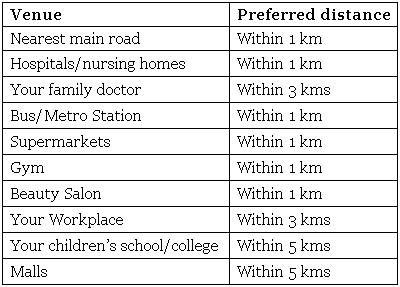Real estate veteran Saket Mohta gives the the most comprehensive 11-point checklist

Buying a home is undoubtedly one of the biggest investments you will ever make in your life. Besides, your home is where you’ll spend some of the most precious moments of your life, be it watching your children learn to take their first steps or the first time you nail your mom’s Dosa recipe! So, we understand that you’re nervous about your decision.
1. Location
There's a time-honoured saying in our industry: 'There are three things that matter in property: location, location, location.'
While we do believe that it's not as simple as that (not that finding the ideal location is), a bad location can and (should) be a real deal breaker. So how do you identify the perfect spot?
Well for one, the location of the flat should suit your daily convenience and be equipped for emergencies. Draw up a list of places/venues that you want close to your dream home and the distance of each place from the house(s) you have in mind to see if the proximity suits you. Here's a sample, which you could customise:

2. Neighbourhood
Whilst it'sfantastic to be able to love thy neighbour and by that extension, your neighbourhood, it can be a lot easier said than done. To ensure absolutely lovable surroundings, do check if you have like-minded people as fellow residents. This is quite simple to find out if the project is already completed and flats are at least partially occupied.
When you visit the project, you could just strike up a conversation with some of the residents living close to the flat you have your eye on. Let them know that you're considering a purchase and that any advice they could help you with in this regard would be most helpful.
This will give you deeper insight into your neighbours as well as any hidden benefits or peeves of living in the project.
If the project is still under construction, visit the trade shows and launches they host to better understand the kind of residents the developers are targeting. Also, do check out the project's digital presence on social media sites, real estate forums, etc, where you might find interested fellow buyers like yourself to chat with.
Other things to look out for are the pollution (air and noise) levels in the surrounding areas. Also, are there slums nearby which worsen the surroundings? Are the roads clean? Is there surrounding greenery so fresh air can seep in?
Your neighbourhood is essentially an extension of your home; so don't discount its importance.
3. Security
The last thing you want to suffer from are sleepless nights in your very own bedroom of your brand, new home.To ensure your homeis a havenof comfort and safety, check if the property has well-placed security cameras as well as round-the-clock security guards.
Can visitors come and go from the apartment building as they please? Is it a crime prone area? NOTHING is more important than the safety of you and your loved ones.
4. Legal compliance
Ensure that the following documents are in order:
a. Area Master Plan
Have you heard glowing reports from the developer about how very shortly, there will be two new malls, an office complex, and a multi-specialty hospital springing up in the vicinity, leading to an upsurge in the property prices there?
Whilst chances are that the developer isn't misrepresenting, it would be wise for you to avail of the Area Master Plan from the respective Town Planning Department and verify the surrounding developments for yourself.
b. No Objection Certificates (NOCs)
These are typically required by the builder as a go-ahead/clearance from the following authorities:
- Urban Land Ceiling (Check applicability for the same)
- Environmental Clearance
- Electric, water, and lift authorities (if applicable)
- NOC from neighbouring property
- You can check applicability for a respective NOC from the municipal corporation in charge of the area the property is situated in
c. Designated Area
You must check with the authority of urban development that the property you plan to buy is located in a residential area and not in a commercial zone (which is illegal, by the way).
d. Conversion Approval
If the place you're intending to purchase is located in a ‘converted zone' (which means the particular area was an agricultural region and has been included in the city through expansion) you should make sure that the builder has gotten approval from the authorities regarding the conversion of the land for commercial usage.
e. NBCI Approval
Ensure that a government allotted agency has appropriately sanctioned the plan and the layout of the building. Also, the building layout needs to be approved by the National Building Code of India.
You can verify the document with the municipal authorities of the property area. It is also imperative to check whether or not the floor your flat is located in is duly sanctioned in the plan of the building.
f. Land Record
Ask your builder to provide you with a copy of the title deed document, which explains in detail about the rights, ownerships, registration and the necessary obligations of the concerned land. You should further verify the documents with the local land record branch.
g. Commencement Certificate
It is necessary for your builder to obtain a commencement certificate from The Town Planning and Engineering Department before they even start excavating the land for construction.
5. Builder Reputation
A fool-proof, 7 step plan to check your developer's street credibility:
1. Conduct a detailed online verification
If the developer is of any standing, there are bound to be illuminating results on blog pages, forums, and the builder's own web presence such as its website, press releases, and social media pages.
Whilst this is a good starting point, it still isn't enough as several builders conduct massive online reputation campaigns to ensure they look their best online.
Which brings us to our next step…
2. Talk to customers and local brokers
What's the word around town about these guys? Are their customers happy with their investments? Are brokers keen to push their properties and have kind words for them?
3. Don't ignore their partners
Completing a project successfully is all about teamwork. Which is why, it's important not only to know your builder but also the corresponding contractor, the marketing partner and their track records.
They all go a long way towards not only the present success of the project but also its future resale value.
4. Analyse the builder's track record
How many successfully completed projects do they already have under their belt? Of what scale and size were these projects? Does the builder have any experience in developing projects of the scale and magnitude of the current project? Have their past projects been completed on time?
Was everything that was promised by their marketing collateral and sales reps, delivered? These are some of the crucial questions you need answers to.
5. Check their affiliations
In the real estate fraternity, you really are the company you keep. A credible real estate developer will likely be a member of reputed associations such as Confederation of Real Estate Developers Association of India (CREDAI), or the Builder's Association of India (BAI). These bodies although self-regulated, set stringent norms and rigorous standards for their members, non-compliance of which typically leads to blacklisting.
6. View their realty ratings
One of the most reliable ratings for real estate projects, the CRISIL Real Estate Star Ratings (Crest) generates city-wise evaluations of real estate projects that can assist you in getting an expert, unbiased opinion on a prospective home.
Another credible rating database you could easily access is the National Developer Ratings list, which appraises a developer and not just the project on factors such as track record in transferring a clean title, conformance to the law and construction benchmarks and adherence to project completion deadlines.
For a project to be rated by CRISIL, the developer has to be registered with them if they don't have sufficient projects under their belt.
7. Ensure that the company has enough liquidity
Check the company's financial statements, particularly the balance sheet and the cash flow to see if the company is overburdened by loans. If possible get a CA or a financial expert to examine it thoroughly before making any decisions.
Remember, if the company is overleveraged, it may fail to complete the project on time or worse at all, due to insufficient liquid funds.
6. Infrastructure
This checklist should help you determine the infrastructural bandwidth of the development:
Parking space
Is there enough or any parking space for your vehicle(s)? Is it free or payable? If payable, how much will it cost over a period of time?
Elevators
Are there enough elevators to support the residential population? If so, are they of the latest models and from a reputable manufacturer?
Senior friendliness
If you have old or invalid people living with you, it is of crucial importance that the place is senior-friendly and allows easy movement and access for handicapped people.
Pet-friendliness
If you own or intend to own a pet, first and foremost, find out if the project has a no-pet policy as a lot of buildings do. If there is no objection to you keeping a pet, do check how easy it would be to keep it healthy and happy there. Is there a walking zone or a park in or around, where your pet can exercise? (Especially crucial incase you own a dog). Is there a good veterinarian or animal clinic nearby? If there are other pet owners already living in the building, seek their counsel.
Water and electric supply and safety; fire safety (Extra development costs or EDCs)
EDCs typically cover amenities such as generator charges, CCTV, water treatment plant, electric transformer, etc. Check how much the EDC is for each amenity and if it covers the requisite facilities.
Other facilities such as gym, swimming pool, tennis court, etc.
The real estate market is evolving at a breakneck pace in India with developers often offering a slew of facilities that could put a 5 star resort to shame. But ever so often, things that look so great on paper, don't really translate to real life.
For instance, in several complexes, the swimming pool that looked so inviting in the brochure (and that residents paid a premium for during purchase) is probably gathering algae and evolving into an ecosystem in and of itself due to poor or no maintenance.
The gym you thought you'd get your six pack in might literally be ill-equipped to give you a semi-decent work out… you get the drift.
So, if the residential project is already completed and brags of all these tempting facilities, do a physical inspection of how they're maintained, especially since these facilities are factored into the price of your home and thereby you're paying good money for it.
In case, the property is still under construction, ask the sales rep how they intend to maintain the amenities and if there is an annual maintenance contract that includes the accompanying costs.
You could also visit completed projects of the developers to see if they these facilities are well taken care of there.
Data and network coverage
Ensure that major service providers offer or are proposing to offer network coverage in the area. You don't want to be cut off from the rest of the world.
7. Resale Value
The resale value of your flat would primarily depend on 3 parameters:
The property prices in the area where the project is situated
If the area is up and coming with a lot of promising ventures and developments in the recent future, then property prices are likely to soar. As discussed earlier, talk to your developer's representative about the same as well as inspect the master plan of the area.
Discuss this with financial and industry experts as well to get an expert's take on how the property prices will pan out in the near future.
The overall project quality
The future prices also depend on how well the project is executed and maintained. Moreover, if the project is a commercial success, this benefit would definitely be passed on to the flat owner in realising better resale value.
One way to gauge this factor is by comparing the ROI on the builder's past projects with competitor projects in the same area to see which yields better results.
The way you maintain your home
We don't need to spell this one out, do we? Treat your abode with respect, keep it beautiful and clean- and it will pay you back in multifold.
8. Budgetary Constraints
You need to make sure you can actually afford your dream home, as the consequences of not being able to pay the full amount during possession can be dire. Cancellation charges can vary from 5 per cent to as much as a whopping 15 per cent of the total consideration of a property value!
Consult a financial expert to ensure the best and most timely way to pay. Besides, reputable real estate companies have consumer-friendly bank tie-ups and easy, flexible, and convenient payment options such as paying a small percentage of the total sales upfront for booking and the rest only once the project is completed and comes in to your possession.
9. The Floor Plan
Do your flat's layouts and interiors fit in with your lifestyle? Does it have the requisite number of rooms to allow your family members their individual privacy? Is it safe and practical enough for your daily routine? Is it flexible enough to accommodate any foreseen or unforeseen changes in your lifestyle or the addition of new family member(s)?
Purely in terms of sound interior planning, does it allow substantial sunlight to stream in? Is there proper cross ventilation across the flat?
Not only verify this for yourself, but if you can, also hire the services of an independent architect or interior decorator for expert opinion.
Moreover if you're a firm believer in Vaastu Shastra or Feng Shui, do check if the flat is built or can be easily changed according to those principles.
10. Proper Drainage System
If rainwater stagnate the roads or the surrounding property frequently, you might want to avoid it.
Alternatively, you could discuss this with the real estate developer as often, the builder can and does take on the responsibility of improving the drainage system of the surrounding area as well.
11. Value for money/comparison with other for-sale flats
At the end, to completely make sure that you are getting the absolute best for your investment create a weighted-average comparison chart using the parameters provided above and others you can think of, for the properties you have shortlisted and are in the process of evaluation.
Find how each parameter stacks against the other across location, budget, builder reputation, etc., assigning higher weights to the attributes that are more important to you.
This resource should go a long way in helping you find your dream home practically and conveniently. Good luck and Godspeed!
What are some of the most important factors according to you for choosing your dream home?
Photograph: Nicolo Di Giovanni/Unsplash.com
Saket Mohta is Director, Merlin Group











 © 2025
© 2025